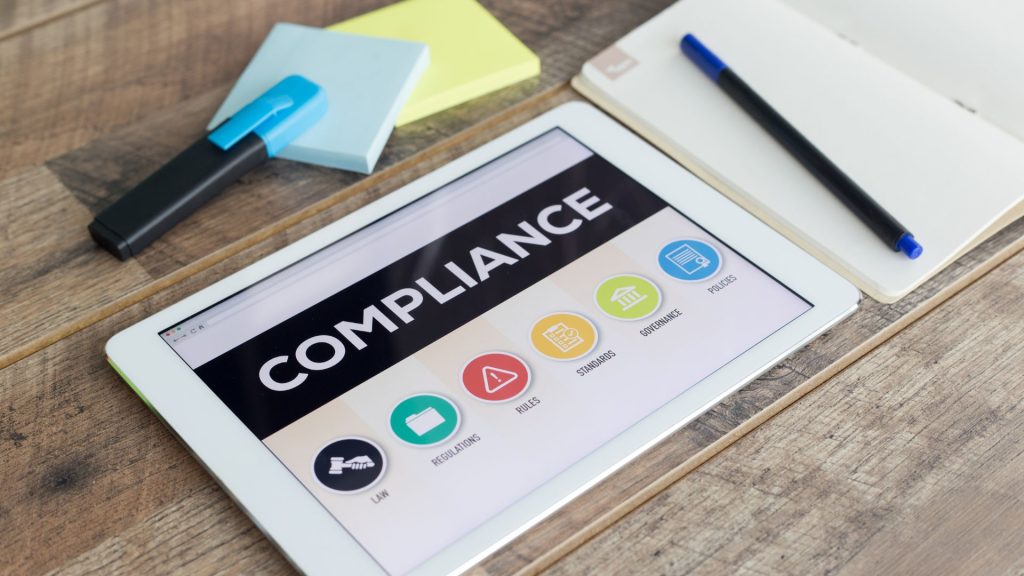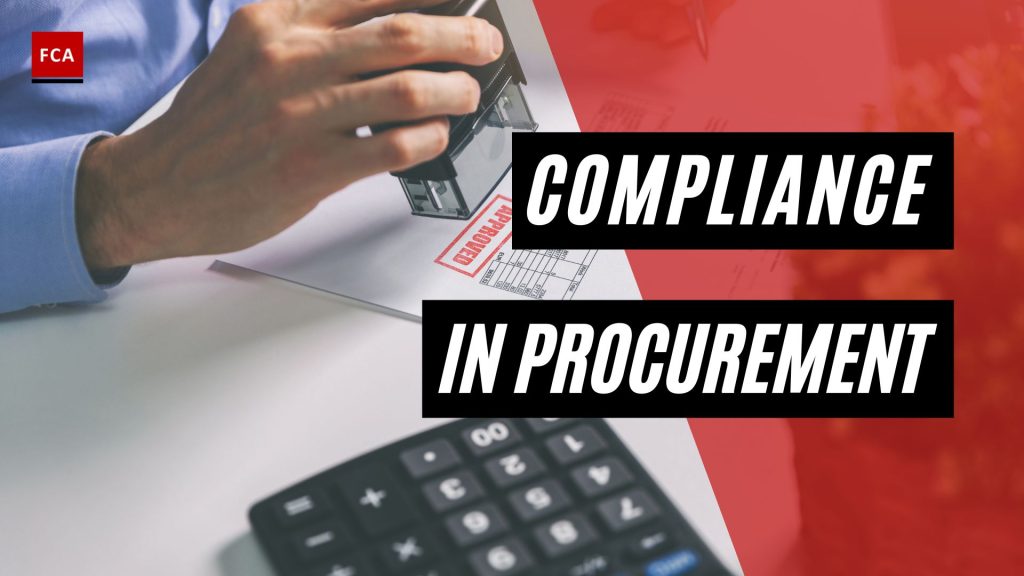The compliance procurement or procedure is usually implemented by businesses that have to follow industry regulatory requirements, for the violation of which they will have to pay fines. That is, compliance is required to check whether cooperation with a counterparty will not violate the national legislation or applicable law and will not lead to negative consequences.

Compliance in Procurement
Compliance in procurement is the process when one party checks the other party’s compliance with the industry-specific rules and rules of doing business of such a party, as well as the compliance of the procurement process with regulatory requirements to reduce potential risks.
As a rule, it is checked whether the conclusion of an agreement will not cause a conflict of interest. This rule applies whether the party complies with the rules of combating the legalization of proceeds of crime or implemented procedures for information protection, anti-fraud and anti-corruption procedures, and other criteria.
Implementing the compliance procedure in procurement is also necessary to check the participant’s compliance with the tax legislation, cooperation with companies subject to sanctions, corruption-related practices, and violations of the labor legislation. In some companies, such checking is conducted within compliance. In others, a separate process may be called “due diligence.”
Their main difference is that no sanctions from the regulator are imposed for the failure to exercise due diligence. That is, the implementation of due diligence is not mandatory. However, when purchasing, it is better to check the participants’ riskiness as much as possible than to incur losses later. The customer may also check procurement participants by other criteria to ensure that the participant is honest.
These criteria depend on the following:
- A type of products or works to be purchased;
- Country of the company’s location, there may be legal restrictions for companies to work in a certain sector or to cooperate with certain companies, for example, the OFAC list;
- A country of company customers’ location, there are specific regulatory restrictions, such as the GDPR in Europe;
- Membership of the company in international organizations or quotation of the company shares on international exchanges.
What to Start Checking of a Procurement Participant?
First, it is necessary to check the legal capacity to determine the legal status and the fact of registration of a procurement participant. It can also be checked that the legal status is in line with the databases. A code is entered according to the Unified State Register of Enterprises and Organizations of Ukraine or a number of a taxpayer’s registration card in the search line.
The next step will be to find out if the signatory of the participant has the authority to take legal action on behalf of the participant. If it is an individual entrepreneur, everything is simple and clear. Still, to check the volume of powers of the signatory of a legal entity, you will need to check the statute and order of the legal entity about the appointment of the signatory.
Then, it is necessary to check the presence of NACE or KVEDs, confirming that the participant can undertake a specific activity. If the participant is a single taxpayer, check whether they can perform work or sell goods within the activities allowed to single taxpayers.
Tax Compliance
When it becomes clear that the checked legal entity or entrepreneur can agree with the organizer of procurement, the taxpayer status of such a participant is checked. It is important to check whether the participant is a taxpayer and determine whether the participant had problems with the tax legislation. Tax compliance of the participant is important because the tax authority is authorized to check all counterparties of the violator, and even honest taxpayers risk facing at least a documentary inspection in case of cooperation with risky counterparties.
The existence of tax debts is to be checked, and existence of tax debts is checked by asking the person to provide the relevant tax certificates.
Then it is checked whether the participant had disputes with the tax authorities related to blocking tax invoices, write-off of expenses, or recognition of economic transactions as unreal. It checked whether the participant was involved in any criminal proceedings. It may be risky for the procurement organizer if the participant has just entered into a tax dispute or if the criminal proceedings have been transferred to the trial level. But in this case, weights are given to the details together. Data on the participant’s court cases can be checked in the “Unified State Register of Court Decisions” or in the tab “Courts” of the You Control system.

Checking the Origin of the Subject of Procurement
After checking tax compliance, it is important to check the legal status of the goods, products, or services that will be purchased, as this may further affect the accounting, tax consequences for the organizer of procurement, the type of agreement with the participant, and other factors. For example, it is worth determining who owns the rights to such software while purchasing software. Defining the tax consequences of paying royalties on a given purchase is important.
While ordering complex repair works, you will have to check how the participant will use the owned or rented equipment and ask to provide documents confirming this. Suppose the participant’s staff provides the service. In that case, it is necessary to check whether such staff is employed, has the qualifications required, and has been properly instructed. This can be checked by asking the participant to provide copies of employment orders and excerpts from briefings.
Not quite new in the world but now, Ukraine has a policy of imposing restrictions on cooperation with certain countries or legal entities or purchasing a particular product. These sanctions are usually aimed at reducing the aggression of certain countries, slowing down some sectors of the economies of such countries, and they can also be directed against a group of people. In Ukraine sanctions, lists are compiled by the National Security and Defense Council of Ukraine.
What else do You Need to Check?
The next stages of checking depend on the internal rules of the procurement organizers. Such stages of checking as checking of violations of the anti-corruption, anti-competitive legislation, or processing of personal data are more typical of international companies present in the Ukrainian market. However, large national companies also implement these warnings in their agreements.
The minimum that needs to be checked while checking the participant for corruption-related offenses is whether the person is in the “Unified State Register of Persons Who Have Committed Corruption or Corruption-Related Offenses.”
As for anti-competitive compliance in procurement, it will not affect small and medium-sized businesses. It is important for the organizer of the bidding to elaborate their documentation so that in the future, no questions will arise or no preferences will be given to one participant over another.
Final Thoughts
Procurement compliance frequently includes the percentage of spend influenced by procurement or the amount of contract spend. Some businesses keep track of how well they use designated suppliers and how well those suppliers perform.
Less likely, you’ll hear about on-time payments, how frequently the accounts payable department used the least expensive payment method, or how well your sourcing professionals adhere to agreed-upon processes and guidelines. Every company appears to have its own definition of procurement compliance and focus areas for how to address it.








